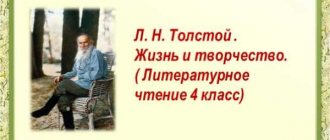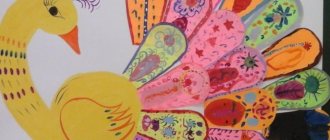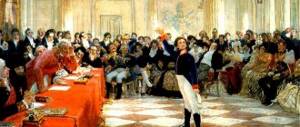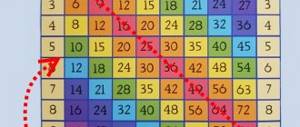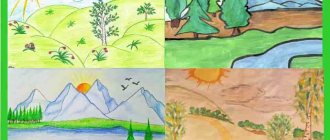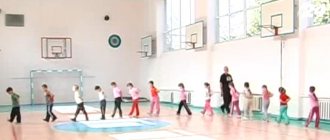Morality lesson in 5th grade
Morality lesson “Live with a clear conscience and in truth”
Author: Pechnikova Albina Anatolyevna, literature teacher of the municipal educational institution “Zaikovskaya Secondary School No. 1” Title of the work: Morality lesson “Live with a clear conscience and in truth” Description: This work contains an extra-curricular activity about morality , based on the study of Domostroy, a set of moral norms and rules of Russian society. The material can be used in class, in conversations, debates with primary and secondary school students. The work contains fragments from essays and original poems by schoolchildren about conscience and truth. Goal: preserving the foundations of morality and the rules of the centuries-old family way of life. Objectives: 1) to cultivate a respectful attitude towards Christian commandments and family values;
2) reveal the content and moral categories of the concept of “conscience”; 3) contribute to the formation of the civic position of schoolchildren. Morality lesson “Live with a clear conscience and in truth”
Progress of the event: Teacher. Vasily Andreevich Zhukovsky called conscience the law and accuser of our affairs, their witness and destiny. It is not by chance that we took these words of the great poet as a basis. Today we will talk about morality. In front of me is a very ancient book. A book called Domostroy. It contains useful information and instructions for adults and children on how to run a household without violating family principles. “Domostroy” is a collection of unique laws about the life and traditions of the Russian family, which spells out the moral values of 16th century society.
Student (1) At different times, our society had ambivalent attitudes towards Domostroi. In the 19th century, for example, it was considered that its charter was outdated because it hampered social progress. Often now we have to rethink long-familiar works of Russian literature. It is especially important that sometimes wonderful poems and stories, previously forgotten or rejected by time, come back to us! Nikolai Gumilyov, Alexander Solzhenitsyn, Andrei Platonov...How much wisdom, optimism and truth they contain! Student (2) Let’s look at the “Teaching of Vladimir Monomakh.” This story is an interesting prose document about a father's instructions to his son. Let’s open it and read: “Laziness, the mother of all evil: a lazy person forgets what he can do, and what he doesn’t know how to do, he doesn’t learn. But while you do good, do not be lazy about everything good.” Reading “Teachings from a Father to His Son” from “Domostroy” Indeed, living in observance of God’s will and commandments is not so easy. Guys, what do you think conscience is? (Discussion of the concept of “conscience” by the guys)
Children: Conscience is a feeling of responsibility for all the actions that you commit. Conscience is a sense of duty. If you promised your mom or teacher to do something, do it! Don't be deceived! You cheated, that means you are unscrupulous! Conscience is my responsibility to myself! It is no coincidence that they say: “tormented by remorse.” It’s as if it lives in you. If you haven’t accomplished what you planned, your conscience “hurries” you from within - do it, do it!
Teacher. You guys were all right, but in your own way.
But the famous collector of words, Vladimir Ivanovich Dal, understood conscience as a moral sense, condemnation or approval of every human act. It depended on the amount of good and evil in people. Let's listen to Natasha Ponomareva's poem about conscience. Author's poem "Conscience"
Once I got a bad mark and didn’t tell anyone! And in that pair there was hidden strength, Now I call it my conscience! Laziness has eaten her away, her friend! There is no way to appease the villainess: “Don’t you dare, don’t reveal it, don’t even think about it, don’t let your mother know about her!”
I didn’t resist for long, I gave in under simple pressure, But the two didn’t let up: “Don’t tell the whole truth!
Just think, you “grabbed” a deuce, you’ll quickly correct it to a three!” I failed to maintain dishonest silence! I confessed by the end of the day and received punishment! Now I don’t have two marks, And the dishonest laziness is gone! Teacher. In literature lessons, we often discussed with you the moral actions of people and human qualities.
I asked each of you to write an essay about conscience. I suggest you listen to some of them. Miniature essay “Voice of Conscience”
I deceived my friends once. Nobody guessed. Suddenly something ached in my soul, I felt ashamed! My conscience woke up, but I was still afraid to admit it! Friends noticed that something was wrong with me! I couldn't sleep for a long time! I was tossing and turning! I was toiling! Have not had enough sleep! I'm sick! There was still a stone on my soul! I thought about it for a long time and decided to tell you! She told me! It became easier, now it was all the same: they would forgive or condemn! Offended! But we forgive you! Now I'm not cheating! Never!
Miniature essay “Conscience the Judge”
Sometimes I do bad things and my conscience torments me! I often tell lies. I'm probably used to it. I lied to my parents once, but I swore I told the truth! My conscience has tormented me for a long time! It didn't take long before the lie was revealed. How ashamed I was! My parents were very upset because of my dishonest act. I was ready to fall through the ground. Then I understood the meaning of the word “crimson.” Of course, I asked for forgiveness, but trust in me was lost. My parents forgave me and said that now I need to try very hard for their faith to return to me. But I have a younger brother! What example did I show him?! This thought haunted me for a long time. Now I try not to repeat my mistakes. Conscience is a real judge for me!
Teacher. (After discussing the students’ essays) Guys, thank you for your sincere confessions in your reflective essays.
And now I would really like you to try to create the image of a conscientious person yourself. We will multiply the reminder and paste it into your diary so that you always have these moral commandments before your eyes. It is not difficult to observe them if you always act according to your conscience and live honestly. Memo for a conscientious person
1) Do everything according to your conscience, be ashamed to act dishonestly or unfairly. 2) Don’t do things that are immoral, even if you think no one will know about them. Remember: the secret always becomes clear! 3) Work with your soul, and not for show; be conscientious. 4) Don’t be indifferent, defend not only your own truth, but also that of others. 5) Know how to forgive and repent, always follow goodness and justice.
Poem “Conscience is known by life”
Justice, kindness, Conscience, truth and consciousness - We have been bringing this knowledge only into children's hearts for a long time.
Mother gives us kindness, Father gives us all justice. Conscience is learned through life, We seek the Truth in the end. Life's path will be long: Everything is in full swing on the eternal road! We wouldn’t be able to turn left from this fast-flowing river... We need to be able to love Just like that, without instructions, And live honestly and honestly, Without asking for rewards. Teacher. Yes, in Maxim Glushkov’s poem we heard truthful words about how each of us should live. So, to summarize the lesson: conscience is a Greek word. The Apostle Paul introduced it into use. He called conscience a tracing paper, which, in his opinion, meant consciousness. But to live in truth, we should not go to Greece. It is no coincidence that conscience and truth were united: “Truth is the Slavic equivalent of Christian conscience.” Today we were thinking about these important moral categories, and “Domostroy” helped us in this! Yes, a book may decay over time, but conscience lives inside us, you cannot deceive it! You can't fool yourself! Every person grows up, and his conscience “grows up” with him. Sometimes you look: a little man is walking, and he has a huge conscience, but it also happens that he is an adult citizen, but he has “not a penny of truth and conscience.” When a lot of truth settles in us, no laziness will fit in the soul, only our “clear” conscience will rule everything.
We recommend watching:
Scenario of a game program for Earth Day for grades 5-7 Class hour scenarios for September 1 in grade 5 Game “Find the treasure” for students in grades 5-7 Extra-curricular activity on tobacco smoking prevention, grade 6
Similar articles:
Extracurricular activity for 6th and 7th grade on the topic of hobbies
Extracurricular activity in geography 6th, 7th grade
Extracurricular activity in 6th and 7th grade. Topic: History of ice cream
Extracurricular activity in grades 6-7 for Valentine's Day
Scenario of the event for February 23 in grades 5-6
Class hour - moral lesson. “Human values” class hour on the topic
Class hour - moral lesson
"Human values"
Topic: “Human values”.
Goals:
- To promote the successful process of self-awareness of students’ personalities, the individual’s acceptance of morally valuable ideas.
- Cause an emotional shift in attitude towards a person based on the principles of humanism, instill moral human values.
Form of delivery: morality lesson.
Progress of the class hour:
Leading:
Farewell, twentieth century, You have become a great reality. We believed in you when you were wrong. Goodbye, twentieth century, because we loved you. Forgive your children for their difficult temperament. Forgive us all for our wrong step.
We dedicate our class hour to human values.
Music is playing.
Leading. When the Almighty decided to create man, a split occurred between the heavenly spirits. One said: “Create man.”
U1: Others said: “Don’t do it.”
Leading. “Create him,” said the spirit of Mercy, “he will believe mercy on Earth.”
U1: “Do not create it,” said the spirit of Truth, “he will defile his soul with lies.”
Leading. “Create him,” said the spirit of justice, “he will decorate life with good deeds.”
U1: “Do not create it,” said the spirit of the World, “he will fill the earth with enmity.”
Leading. The Lord cast down Truth to Earth. And the Angels of Service prayed, saying: “Lord of the worlds! Why do you stain the Truth, the seal of your greatness? Raise her from the Earth, Lord!”
U1: And while the spirits were arguing among themselves, the work of divine creativity was realized. Leading. “Why,” said the Lord, “are your quarrels? The creation of man has already been accomplished.”
What is a person? Can he be considered a unique creation on Earth? What is human nature? What is his inner world like? What are human values? What does a person bring into this world? These questions interested our distant ancestors, and they interest us too. Philosophers from different eras reflected on “eternal themes” about the meaning of life, about human values. I invite you to continue the conversation with me about how you imagine a highly moral person? What qualities should he have? What should I be able to do?
1 student. First of all, he is a noble man.
2 student. Honest and kind.
Z student. Never betraying and able to sacrifice himself for the sake of others.
4 student. He is tactful and cultured.
5 student. 1tolerant towards people.
6 student. Friendly.
7 student. Responsive and attentive.
8 student. Caring and understanding.
Host: These are the words that allow us to characterize the concept of “human values.” And a person, guys, who has such values is a tolerant person.
U1:
Human! This is a high rank. Man, like a star, is born in the midst of an unclear, foggy milkiness, and begins in infinity. And it ends in infinity... Generations create the imperishable earth, century after century. Man, like a star, is born so that the Universe becomes brighter.
There is a song about a man.
Leading. Dear guys, you have listed many good qualities that are inherent in a moral person. And I am very glad that you want to be surrounded by kind and caring people who would help you, understand you, and accept you for who you are. To make it interesting and easy for you.
Inserting a verse.
Naturally, the people around you want the same thing, so that you perceive them as they are, with their traditions and customs. Yes, people should be helped, this is our duty to conscience. But how to become modern, cultural, educated, responsible. After all, there is responsibility for work, for behavior, for love and hate, for the words you utter, for a friend, etc.
One of the students reads a poem (against the background of music).
Why love and hate? Why lose, why seek? Why remember the past? Why do all the living live? What is the meaning of life? Is it possible to change someone else? Open, break and screw again, Predict fate without hesitation, Then boldly show the way there And not let you go astray, Push and condemn, preventing you from making a mistake? Who gave us this right? I don’t know that either, oh, I don’t know, really... What is her law? And it haunts me, My childish head, One single question: Why was I born and raised?
Leading. It is very good if you ask yourself this question. After all, life must have meaning. Our country has very sad statistics, indicating an increase in crimes, overcrowded prisons, mass violence, contract killings and terrorist acts. Many films are permeated with incredible cruelty. Why do we take from abroad not positive, but negative? One American political scientist wrote: “You want to imitate us, but instead of adopting the best, you, having mixed up the taps, turn on the sewer instead of the water supply.” In fact, we do not try to adopt hard study, conscientious work, the ability to keep our word, love for the cleanliness of our bodies, homes, streets, cities, pride in our country, respect for state symbols, kind and caring attitude towards the elderly and disabled. We don’t think about the fact that they have a limited time for showing erotica there, unlike us. And our children want to get as much pleasure as possible with minimal work and responsibility, or better yet, without them at all. The waves of well-being, the fabric of communication are a continuous element in which we flounder, drowning ourselves and each other.
Meanwhile, there is something else. You can see, understand, improve yourself. You can see and you can know. And we need to see it as soon as possible, find out as soon as possible. And you will be able to realize yourself very beautifully and usefully. There will be no need to ask: “What about kindness and compassion, where is love and justice, participation and care for others? Are they really dead?
Listen to a poem written by someone your age.
We look through beautiful mirrors and see life as a clot of darkness. Without distinguishing any warmth, no happiness, no love, no beauty. And the kindness in those mirrors is deception, pretense and destructive evil... So why do we look like that through the fog At the lying, corrupt glass? Why notice the bad in people And talk about other people's mistakes? Why suffer from black envy, pour streams of hatred on everyone? We simply stopped respecting, appreciating goodness, laughing and loving. We gradually began to forget what it means to live in the full sense of the word.
Leading. Now you will hear one story called “Hospitalism”.
U2: A girl, smart and the favorite of all the staff, died in the hospital. The unfortunate “abandoned” child, who was three years old, died from an illness: “hospitalism.” And she is not the first and probably not the last. This disease develops because there is simply no one to caress the child, sing a song, or kiss him good night. With all the love the nurses had for her, they had no time for the child when there were so many worries: the main thing was that he was fed and dry. But the entire staff was shocked. Die from inattention! Isn't it scary?
Leading. Once again I want to ask why the little one died (Answer: from lack of love and affection). Here's another case.
U3: A girl was accosted by hooligans on the street. It was still light, there were a lot of people around. Everyone walked by and pretended not to notice anything. Only one young man came up and tried to calm the hooligans. A fight ensued. When one of the hooligans pulled out a knife, the girl screamed. No one came in response to the cry. The hooligans wounded the young man with a knife and ran away. The ambulance didn't have time to arrive. The indifference and fear of those around him killed the young man.
Leading. There are a lot of such stories. But is it really that bad? You can object to me and give your own positive examples. Over to you.
P4: I know a girl who selflessly takes care of a sick old woman. She comes to her every day and does everything necessary. This is an example of moral virtue.
Leading. Another example of morality.
U5: Valya and Mitya are the same age, they grew up in the same house and for the sixth year in a row they have been going to school together.
One day such a story happened to us. It was an ordinary morning, and there was snow on the street, and they were going to school in the most ordinary way. Not far from the school they met a stranger. Broad-shouldered, tanned, wearing a dashing long-distance sailor's cap, he immediately headed towards Valya and Mitya.
It happens! Apparently, the sailor also paid attention to them, because at first he slowed down, then smiled in a friendly manner, and finally said: “Excuse me, my lady! I beg your pardon, sir! It seems to me that the lady's hands are frozen. If you allow me, I’ll bring the briefcase.” And before the guys realized what was happening, the mysterious sailor took the briefcase from Valya’s hands and walked alongside. The rest of the way to school, the sailor chatted with the guys cheerfully and naturally. And just before the door, he handed Valya Mitya’s briefcase, saluted them and disappeared. Probably, everything would have ended there, but the next day, on the same ordinary morning, Valya stopped and said to Mitya: Sir, my lady’s hands are frozen. Take her briefcase. And Mitya took the briefcase. But just before the school door, the guys ran into Vitka and Andrey: “Ha,” Vitka shouted, “Just look at this couple!” What are you, Mitka, a donkey? Or is she sick? Or are you hired?
“Blush! Blushed! Blushed! - Andrei shouted across the street. “Vitka, just look how red he is!” Mitya was embarrassed, he really blushed. But then Valya came to the rescue. As if nothing had happened, she said: “Please, sir, don’t pay attention, we are late.” And Mitka remembered the cheerful sailor. No, the sailor would never have given the briefcase to Valya at such a moment. And pride began to speak in Mitya. He decisively stepped forward, opened the school doors, let Valya in and helped her take off her coat. “Thank you, sir,” Valya said and headed to class. Since then, Mitya carries Valya’s briefcase to school and helps her take off her coat.
Leading. And who, guys, “breathed” into Mitya this breath of courage, boldness, kindness, responsibility? (Answer: sailor).
P6: With his unobtrusive male moral example, he seemed to show Mitya what a man is. And how correctly Mitya reacted, and Valya turned out to be not a timid person.
Reading the poem “To become a man...”
To become a man, it is not enough for them to be born. To become iron, it is not enough to be ore. You must melt, break and, like ore, sacrifice yourself.
Leading. A person always has a choice, but the main purpose of a person is to do good, and this requires effort. Everything high and good has roots in good deeds (an example about the king who abolished the cruel law of cutting off hands for theft). I want to give an example where two very important human qualities are very closely intertwined: love and kindness.
In one country there was a very cruel custom of cutting off hands for theft. A nobleman, the king's favorite, was caught stealing. The king issued a decree to cut off his hand, despite the fact that he loved this nobleman very much. The nobleman had a daughter. She learned about the punishment and came to the king. She extended her small, fragile hands to the king and asked: Cut off my hands, I can withstand anything, just don’t touch my father’s hands, he needs them more than I do, please, I ask you.” “Okay,” said the king. “We will cut off your hands.” The king really liked this little girl who loved her father so much. And the king remembered his daughter at that moment and thought: “Does my daughter love me so much, would she do such an act?”
And so the girl was led to execution, she stretched out her arms, at that moment she was thinking about her father, who was in prison. The sword flashed and fell without even touching the tips of her small fingers. “The king forgives your father for your great love!” - announced the king's messenger.
The next day, the king finally canceled this cruel decree forever. And in the execution yard he placed a pillar with an inscription describing the girl’s feat. At the end of the inscription it was written in large letters: “Happy are the fathers who have such children!”
U7:
To create good and evil is always in the power of all people, But evil is created without difficulty, It is more difficult to create good. The beast gives birth to the beast. A bird gives birth to a bird. From good comes good, from evil comes evil.
Leading. Everything must be done with a good heart. You cannot learn anything if evil lives in your heart. Think guys, are you capable of:
- forgive the offense
- share the latest with a friend,
- give in to the weak
- take care of elders
- help, console,
- donate.
These are high qualities and need to be learned. I think everyone will make an effort to be a worthy person. “To those who have not comprehended the science of good, every other science brings only harm” (M. Montaigne).
Perhaps someone wants to ask me a question: why be a moral person? After all, this is much more difficult than living for yourself without thinking about anything. Who will answer what human values are needed for?
U8: I think that indifference and non-participation will lead to you being treated the same way.
U9: We all live among people, why live is useless, because life is made up of good deeds, and in old age you will have something to regret or not to regret.
U10:
And if with affection and compassion you soften the lot of an orphan, then before severe torture you will be freed from want.
Slow music is playing.
U11:
Oh, if you are calm, not confused, When people around you lose their heads. And if you remain true to yourself, When your best friend doesn’t believe in you, And if you know how to wait without worry, You won’t answer lies with lies, You won’t be angry, becoming a target for everyone, But you won’t be called a saint either.
Leading.
And if you control your passion, And it is not you that is ruled, And you will be firm in success and misfortune, Which, in essence, have the same price. And if you are ready for the fact that the living word turns a rogue into a trap, And, having suffered a wreck, you can again, Without the same strength, resume your work.
U11:
And if you are able to put everything that has become customary for you on the table, to lose everything and start over again, without regretting what you have acquired, and if you can turn your heart, your nerves, your veins, so that you can rush forward, when your strength changes over the years, And only the will says: “Hold on.”
Leading.
And if you can be yourself in the crowd, Keep in touch with the king with the people, And, respecting any opinion, Do not bow your head before rumors, And if you measure distances in Seconds, setting off on a long run, the Earth is yours, my boy, property! And, moreover, you are a Human!
I can only wish that you become real, highly moral people, and that you meet worthy people along your path. It may be difficult to be a Man with a capital M, but this is the meaning of life. I would like to finish our moral lesson with the words of John Chrysostom about the purpose of man: “God did not bring us into this life and give us a soul so that we would use only the present, but so that we would do everything for the future life.”
Extracurricular activities “The ABC of Morality” for 3rd grade.
| № | Section name | Theory | Practice | Total hours |
| 1 | Introduction | 1 | 1 | 2 |
| 2 | School etiquette | 2 | 2 | 4 |
| 3 | Rules of communication | 2 | 3 | 5 |
| 4 | About hard work | 3 | 3 | 6 |
| 5 | Appearance culture | 2 | 2 | 4 |
| 6 | Extracurricular etiquette | 3 | 3 | 6 |
| 7 | Generalization: idea of moral qualities | 4 | 3 | 7 |
| Total: | 17:00 | 17:00 | 34h. |
Extracurricular activities program
spiritual and moral education and development of students “The ABC of Morality”
Characteristic features of the content are: the presence of tasks that ensure the formation of universal learning activities (ULA), skills and methods of activity; the opportunity to carry out interdisciplinary connections with other academic subjects of primary school.
The program also determines the required minimum of practical and creative work.
Interdisciplinary connections:
•with Russian language lessons: annotation to the read work (2-3 sentences). Recording a description of the character's character, first experiments in trying out the pen (writing stories, telling stories);
•with fine arts lessons: illustrating on the topic, using paints to convey one’s attitude towards the characters of the work, lessons in collective creativity on the topics of the course;
• with music lessons: musical images of heroes of works;
•with labor lessons: book binding, working with book elements, repairing textbooks and books in the classroom library.
| № | date | Subject classes | Content | Personal results of mastering the course | ||
| according to plan | By fact | |||||
| ||||||
| 1. | Deed. Motive of the action. | Theory. | Conversation. Familiarization with the inner essence of a moral act - motive. A person's responsibility for choosing an action. Familiarization with moral qualities as a result of behavior according to moral standards. | — initial ideas about moral concepts and norms (kindness and compassion, mutual assistance and care for the weak, courage, honesty, etc.), about moral behavior and the responsibility of each person for his actions; — development of moral and ethical standards; -the desire for self-education of moral qualities, understanding and acceptance of the concept of conscience. | ||
| 2. | Fair and unjust actions. | Practice. | Conversation. How should you act in relationships with other people in order for your actions to be fair? Workshop. Preparation and performance of fairy tales about justice. | - the concept of justice, fair action, fair treatment of another person; -development of moral responsiveness in the process of emotional experience of a literary text; - the ability to express one’s emotions in dramatization; - respond to good feelings when perceiving images of fairy tale heroes. | ||
| 2. School etiquette (4 hours) | ||||||
| 3. | School traditions of our people. | Theory. | Conversation. What is tradition. What school traditions do our people, our city, and schools have? Why do you need to know school traditions? Presentation: “Holidays of the School Country” | - know what traditions are and why they are needed; -formation of a holistic, socially oriented view of the traditions of the school in unity with the traditions of our city and country; - awareness of oneself as a citizen of Russia, involved in the traditions of the entire Russian people; - presence of motivation to respect the spiritual values of Russia. | ||
| 4. | Take care school property. Knizhkin's workshop. | Practice | Conversation. Material values are created by the labor of many people. School is our home. How can we take care of school property? Workshop on minor repairs of school textbooks and classroom library books. | - the presence of motivation to take care of the material and spiritual values of the native country, created by the labor of people; — acceptance and mastery of the student’s social role, formation of the position of “school owners”—responsible for the safety of school property; -understand the purpose of the library; - presence of motivation to work, aimed at results. | ||
| 5. | Mutual aid in study and work. | Theory | Conversation. Should people help each other? How do you understand the word mutual assistance? What types of mutual assistance can we have in our class? Workshop. Organization of mutual assistance among students in the class based on student suggestions. | -development of goodwill, emotional and moral responsiveness, understanding and empathy for the feelings of other people; - focus on mutual assistance in educational and extracurricular activities, in everyday life; -developing skills of cooperation with peers in different situations; helping each other in studies, in creative activities, in everyday matters. | ||
| 6. | What games do we play (at recess, in the school yard) | Practice | Conversation on dramatization. “Who rests how?” How should you rest? Why do you need to do something during rest? Workshop. Correcting busy behavior during breaks: compiling a collection of games and activities for school breaks. | - dramatize works on the topic of the lesson; -perceive the emotional content of literary texts; - highlight the dominant character - the characters of the script and convey it in the dramatization; - express feelings, convey mood and perceive them; - collaborate with classmates in creative activities and when compiling a collection; be able to make rational proposals, carry out feasible tasks, take responsibility, organize your own work and the work of your comrades. | ||
| ||||||
| 7 | Accuracy: protect your time and the time of others. | Theory. | Conversation: “Order saves time.” Workshop. Collective development of rules for rational time management. View excerpts and discuss “Tales of Lost Time” | - awareness of the value of time in a person’s life; -formation of the concept of rationality; -possession of communication skills in order to realize opportunities for successful cooperation; — the ability to watch a video sequence and comprehend it; - the ability to analyze, express one’s opinion, and, if necessary, defend it. | ||
| 8 | Your speech: the word heals, the word hurts. | Practice. | Conversation. How violation of speech norms interferes with mutual understanding and successful communication. Workshop. Analyze your own and other people’s speech, the degree of politeness (polite-impolite-rude) in text media. Evaluate the correspondence of words to good deeds. | - awareness of language as the main means of human communication; — consolidation of the concept of speech norms; -the ability to self-esteem based on observation of one’s own speech; -developing the ability to evaluate classmates according to specified criteria; - determine the author’s position and express your attitude towards the hero and his actions; - prove and confirm your own judgment with facts (from the text). | ||
| 9 | Your friends and you. Collectivism. | Practice. | Conversation. “When my friends are with me” What is collectivism? Workshop. KTD "Journey to a distant planet" | -formation of the concept of collectivism; — development of ethical feelings, goodwill, emotional and moral responsiveness, understanding and empathy for the feelings of other people; -development of cooperation skills with peers in different social situations; - the ability to accept the conditions and rules of the game and comply with them until the end of the event. | ||
| 10 | What is justice? | Theory. | Conversation. "What is justice?" Just society. Workshop. Reading folk tales, discussing the end of a fairy tale - does justice always prevail? | - development of fair treatment of people based on ideas about moral standards, social justice, freedom; - express your own opinions and give reasons for them; -gaining experience in emotional comprehension of folk art, empathy for the heroes of fairy tales; -prediction of situations with the “...what if” attitude. | ||
| 11 | Justice in works of folk art. Heroes of Russian epics. | Practice. | Workshop. Reading fairy tales by role (dividing the class into groups, choosing fairy tales independently), discussing the morality contained in the fairy tale. | -development of cooperation skills with peers in group work; — ability to self-organize; -ability to overcome difficulties; -readiness to use the training received in educational activities in solving practical problems that arise in extracurricular activities; - the ability to highlight morality and understand the folk wisdom of a fairy tale. | ||
| 4.About hard work (6 hours) | ||||||
| 12 | Hard work in culture. Labor feeds, but laziness spoils. | Theory. | Conversation. Why does a person live? | — curiosity, activity and interest in learning about the world; -the ability to reason, express one’s own judgments, and give reasons for them; - formation of a respectful attitude towards other people’s opinions; | ||
| 13 | Organization at work. | Theory. | Conversation. What does it mean to be able to work? Why do you need to be able to work? How to properly organize your work. Joint preparation of a memo “Rules of rational labor” | |||
| 14 | Who do I want to be? Why? | Practice. | Conversation. Does a person need a profession? Story: “Choosing a profession” How to choose a profession, because there are so many of them? Practical task: what professions do you think are best suited for you? Analysis of your abilities and desires to choose a profession. | - the desire to learn the laws of life in modern society; - desire to find one’s place in society; - discover your abilities; - analyze your needs and desires, adapt them to life. | ||
| 15 | Any work is honorable. | Practice. | Conversation: “If laziness settled in the city” Why people should work. Any work is worthy of respect. Practice. Drawing about working people. | - realize the victory of good over evil; -give examples from life of situations relevant to the topic of conversation; - express your own opinions and give reasons for them; — create illustration drawings for a given topic, express emotions and mood in your drawing. | ||
| 16 | Respect for the work of our people. | Theory. | How people work in our country. A person glorifies his homeland with his work. Why you need to respect human work. | - value attitude towards work, working people, labor achievements of Russian citizens; — formation of the foundations of civic identity, a sense of belonging and pride in one’s homeland, for one’s people; - awareness of one’s ethnic and national identity; -the desire for one’s own creative work activity; - awareness of the priority of the moral foundations of work, creativity, and the creation of new things; — presentation of the collected information in the form of an exhibition. - the ability to give examples from life of situations relevant to the topic of conversation; - express your own opinions and give reasons for them. | ||
| 17 | For whose work is our city famous? | Practice. | For whose work our city is famous. Photo exhibition “Professions of our parents” Inviting parents to a lesson. Dramatization “What are hands for?” | |||
| 5.Culture of appearance (4 hours) | ||||||
| 18 | Everyday and festive clothes. | Practice. | Conversation “They greet you by their clothes...” Festive and everyday clothes. What and where to wear. Game "Pick up clothes" | - understanding the value of beauty as perfection, harmony, ideal; - striving for ideal - starting from small things - accuracy in one's own appearance. — formation of aesthetic needs, values and feelings; -the ability to be critical of your own appearance and the appearance of your comrades; - the ability to tactfully make comments about deficiencies in clothing; - education and development of caring, ability to come to the rescue; -share tips on caring for clothes of different seasons. | ||
| 19 | Accuracy. My wardrobe and how to care for it. | Theory. | Conversation: “A neat person is careful in everything” “Tips for caring for clothes” - an invitation to one of the children’s mothers to tell a story. | |||
| 20 | Clothes of the peoples of Russia. | Theory. | Presentation “Clothing of the peoples of Russia” Conversation “What is common in the clothes of different nations?” | -gets acquainted with the culture of the peoples of Russia, reflected in clothing; - understands the importance of preserving national traditions in folk costume; — interested in the history of the peoples of Russia; -knows, preserves and shares knowledge about the culture, traditions and clothing (in particular) of his people; — knows and respects the traditions of the indigenous peoples of the Khanty-Mansiysk Okrug. | ||
| 21 | Elements of folk costume in modern culture. Needlework. | Practice. | Mini-projects “Clothes of my people” Making the ornament of the Khata peoples on paper. The meaning of ornament in Aboriginal culture. | |||
| 6. Extracurricular etiquette (6 hours) | ||||||
| 22 | My phone rang. | Practice. | Interlude “Telephone” (K. Chukovsky) Practice. Compose telephone dialogues in pairs. | - create a prose or poetic text by analogy with the author’s text, using means of artistic expression; -development of cooperation skills with peers in pair work; — ability to self-organize; -ability to overcome difficulties; -readiness to use the training received in educational activities in solving practical problems that arise in extracurricular activities; - the ability to apply the rules of politeness in conversation. | ||
| 23 | Rules of conduct when visiting. | Practice. | KTD "Away" | -development of cooperation skills with peers in group work; — ability to self-organize; -ability to overcome difficulties; - application of knowledge acquired in class in a practical game situation. | ||
| 24 | Why is writing a mirror of the soul? I'm writing a letter. | Practice | Interlude “Letters” (E. Trutneva) Conversation “Why do people write letters” Practice. Letter to a soldier. | - knows what letters are needed for; - is able, in accordance with age, to express his thoughts and feelings in writing. | ||
| 25 | Rules of behavior in nature. | Theory. | Conversation “The importance of nature for humans” How to behave in the forest, in the field, near the river. | - knows and follows the rules of safe behavior for himself, others and wildlife; - loves, appreciates and enjoys nature; - understands the importance of nature for human life and all humanity; - treats nature with care. | ||
| 26 | We are Nizhnevartovians. Behavior on the streets of our city. | Theory | Discussion: “What is a public place and how to behave there.” Street vandalism. Why is he dangerous? | - knows and follows the rules of safe behavior on city streets; - treats public property with care; — feels that he belongs to society | ||
| 27 | Your favorite museum. | Theory. | Museum as a source of art. Conversation: “Why you need to visit museums” Presentation: “Museums of our city.” What museums have you visited? Practice. Studying the interests of children and drawing up a plan for visiting museums in the city. | — gains experience in understanding folk art, ethnocultural traditions, elementary ideas about the aesthetic and artistic values of artistic culture. | ||
| ||||||
| 28 | Collectivism. | Theory. | Conversation. Each for all - all for one - the main rule of the team. About following the requirements of the team. Discussion of the story: “Who is the odd one out on the team?” | - compare, contrast, do a basic analysis of various texts, using a number of literary concepts (folklore and author's literature, text structure, hero, author) and means of artistic expression (comparison, personification, metaphor; - determine the positions of the characters and the author of the literary text; | ||
| 29 | Mutual assistance. | Theory. | Conversation. Mutual assistance and mutual support of the children of our class. Empathy with comrades in joy and sorrow. Discussion of the story by A. Rekemchuk “Monologue about Friendship” | - determine the positions of the characters and the author of the literary text; - be respectful of other people's opinions; -participate in the discussion; - development of attentiveness and goodwill. | ||
| 30 | Justice. | Theory. | Conversation “What is justice” Reading and discussion of the fairy tale “Moroz Ivanovich” | - distinguishes justice from injustice; - be respectful of other people's opinions; -participate in the discussion; - the ability to give examples from life of situations relevant to the topic of conversation; - express your own opinions and give reasons for them. | ||
| 31 | Accuracy, commitment. | Theory. | Conversation “What is the 0:0 law” Collective discussion on the topic “Do I need to be an obligatory person” | - awareness of the value of time in a person’s life; -formation of the concept of obligation; - the ability to analyze, express one’s opinion, and, if necessary, defend it. -give examples from life of situations relevant to the topic of conversation; - express your own opinions and give reasons for them; - strives to be an obliging person. | ||
| 32 | Friendship, camaraderie. | Practice. | Conversation: “What is the difference between a friend and a comrade.” Oral essay: “About my best friend” | - create a prose or poetic text by analogy with the author’s text, using means of artistic expression. | ||
| 33 | Caring for nature. | Practice. | Conversation about nature conservation. KTD "Forest Festival" Subbotnik - cleaning the school grounds. | - careful attitude towards the environment; - awareness of oneself as part of the natural world; - attitude towards nature as a source for experiencing a sense of beauty and harmony; -gains initial experience of participating in environmental activities at the school site. | ||
| 34 | Let's preserve the beauty of our city. | Practice. | Participation in an environmental action to clean up the territory of Komsomolskoye Lake. | - to realize that our city is a small homeland, a part of our native land, our native country; — gains personal experience of participating in environmental initiatives. | ||
